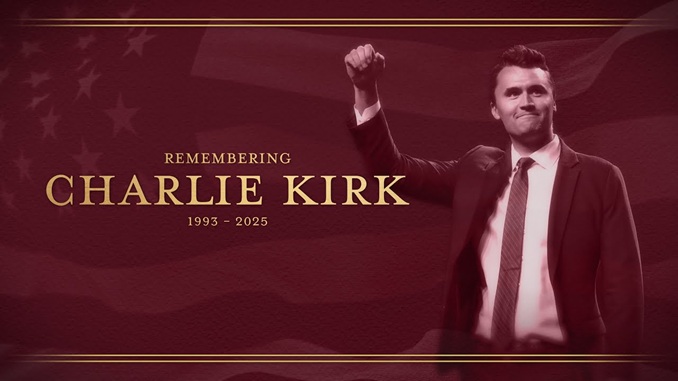By David Farah |
I believe we’re entering a new era in America—one rooted in faith, honest communication, and a reckoning with the cultural shifts of the last decade. When Obama promised “change,” a lot did change. The culture wars were beginning. Under Trump, I saw clearly how far things had shifted.
Growing up during the Clinton and Bush years, I never experienced anything like what I felt today at Charlie Kirk’s memorial. The closest I can compare it to is the unity after 9/11, when President Bush rose to the occasion and brought the country together. That moment felt patriotic and spiritual, but it quickly turned into years of war, driven more by geopolitical motives than true healing.
I’ve always viewed the 1980s/90s revival era as a defining chapter in American politics. My generation saw how politicians—especially Republicans—learned to use evangelical faith as a tool. Democrats, or “the Left,” recognized their power and worked to undermine it. I believe there was a deliberate effort to expose evangelical leaders’ weaknesses—whether through moral failings, wealth, or ego. Social media amplified their downfall, turning disappointment into widespread cynicism.
As social media grew, so did the divide. When Obama ran for president, tech and media backed him heavily. California became the epicenter of progress, and Republicans fell behind. That’s when the term “RINO” started to mean something to me—they represented the failure to adapt. In a world driven by innovation, being labeled “traditional” felt like being left out.
I lived in Palo Alto during the tech boom and witnessed global change firsthand. Managing operations at the Four Seasons Silicon Valley, I served world leaders, tech giants, and political insiders. I personally took care of Hillary Clinton and her team during private meetings with Apple, Google, and Facebook—meetings the public never saw. I met John Kerry, Saudi royalty, and liberal power brokers. But I rarely saw conservative or Christian-backed leaders in those rooms. They weren’t part of the conversation.
I made friends with many of these influential people. They weren’t biased; they were simply engaged by one side. That absence made me question the relevance of the faith and political institutions I grew up with. The party I was raised in, and the church I trusted, felt ideologically broken and behind the times.
In short, I watched the leaders of my youth fall, the institutions I believed in lose influence, and the movement I once trusted become disconnected from the future. Today, I’m hopeful—but only if we’re willing to confront the past honestly and move forward with clarity, unity, and purpose.
I saw early on how tech’s influence would spread across the country. As social media began highlighting the failures of evangelical leaders, I felt increasingly isolated. The revival era of the ’80s and ’90s had let us down—our leaders fell morally, and their failures were broadcast everywhere. Those who remained, like Franklin Graham, were respected but felt distant and out of touch.
The Obama years deepened that divide. Tech firms pushed for global diversity, and their founders sparked a capitalist renaissance not seen since the days of Carnegie. The Left’s platform aligned perfectly with what tech needed: inclusion, global talent, and unchecked influence. Social media reshaped the narrative and slowly eroded the moral and spiritual foundation I grew up with.
After Trump’s first term, the attacks intensified. He was up against tech giants, RINOs who didn’t understand the fight, and Democrats who piled on. Despite his wealth and boldness, he couldn’t win. Watching him get crushed daily felt like déjà vu—we won, but somehow still lost. It was disheartening. If Trump couldn’t break through, maybe no one could. My friends and I went quiet. We didn’t abandon our values—we just felt like America had moved on without us.
The Biden years were another blow. Faith leaders were either gone or silenced. The Left dominated social media, and figures like “The Squad” rose to power. Pelosi held the reins, and the Right couldn’t keep up online. That weakness, I believe, opened the door to absurdities like social gender ideologies. Donors like Soros understood the power of revival and worked to widen the cultural divide. The trans movement, while ideologically complex, became financially lucrative for the right people. The Left controlled through chaos—Antifa, BLM riots—while tech platforms promoted the disruption.
I internalized all of it. The noise, the division, the silence from our side—they wore me down. But today changed everything.
In the midst of all this chaos, Charlie Kirk stood alone. He was the only warrior left who truly represented us—those of us who had stayed silent. Charlie was the leader Boomers had hoped for. He did everything right. He gave them hope that their revival wasn’t in vain. He visited college campuses, places often considered lost causes, and transformed Gen Z through logic, love, and courage. He faced threats and hostility, but he reignited the heart of a movement that had gone quiet.
Charlie gave Gen Z belief, gave Millennials hope, and reassured Boomers that their fight for freedom wasn’t wasted. Today, I saw thousands worship, leaders speak about faith and purpose, and an arena filled with people who were genuinely moved. I’ve been to many political events—most felt staged. This one didn’t. Everyone believed Charlie was there for them personally. And he was.
I never felt called to politics or Turning Point. My path has been business, and I believe that’s where I’m meant to be in this moment. My father has balanced both worlds with grace, and I hope to learn from him. My sister has played a key role in supporting Turning Point’s most influential figures. While I wasn’t involved, I’m grateful to them for giving me a seat at today’s event—an event that I believe will shape generations.
What I witnessed today is what my parents, aunts, and uncles described from their youth. Boomers might call it a revival. My generation and Gen X might call it a turning point. We have high hopes that this time, it’s real.
We heard the most powerful voices in America say they won’t let Charlie’s legacy die. If they mean it, and if Gen Z keeps the momentum, Boomers support it, and Millennials finally engage, we could see a transformation unlike anything this country has ever known.
Charlie was our champion. If his message multiplies, America will change. Based on what I saw today, I believe it can happen—and I truly hope it does.
David Farah, a Pepperdine grad, has a partial ownership stake in a growing business in the Phoenix Valley. His father, Barry Farah, is an early donor to Turning Point USA and had an eleven-year friendship with Charlie Kirk. David grew up in a Christian conservative home.








